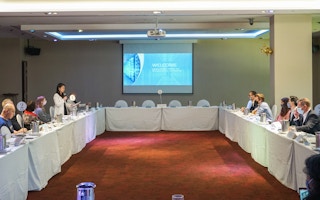As the Covid-19 pandemic continues to accelerate the global digital transformation, demand for data is burgeoning, and along with it, the energy needed to power the digital economy.
In the last 15 years alone, the number of connected gadgets around the globe has increased from nearly zero to around 35-50 billion devices. With this rapid rise in demand, the sector has fallen under scrutiny for companies to manage the growing energy footprint of their data centres.
While there has been strong action on energy efficiency from data centres, the problem is that data requirements are rising exponentially, said business leaders at a closed-door roundtable organised by Engie Impact.
Titled A green digital revolution: Net zero and beyond, the roundtable brought together experts to discuss best practices in decarbonising tech companies.
“While there is a high level of ambition on sustainability globally, with many net zero announcements by companies and governments, action is lagging,” said Malavika Bambawale, Asia Pacific managing director at Engie Impact.
Under the science-based targets initiative (SBTi), over 1200 companies have set emissions reductions targets, and over 400 corporates have committed to business models that are compliant with limiting temperature rise to 1.5°C above pre-industrial levels to stave off the worst impacts of climate change.
Industry leaders like computer firm Apple have committed to net zero emissions across its entire business by 2030, while Microsoft has taken one step forward with the goal of being carbon negative in the same timeframe.
But Engie Impact found through a survey that while 67 per cent of global technology companies see successful sustainability programmes as a source of competitive advantage, only 19 per cent of them believed that they have successfully executed these programmes.
In addition, 30 per cent of technology companies cited no C-level or board responsibility for sustainability programmes, compared to 20 per cent across other industries. Without C-level involvement, it’s difficult to find momentum and drive sustainability, cautioned Bambawale.
In Asia Pacific—the fastest growing region for data centres over the next five years—technology companies face pressure from global headquarters to drive sustainability, but find it challenging to implement.
For example, over 170 companies have joined initiatives like the RE100, through which corporates commit to sourcing 100 per cent of their power needs from renewables. But under RE100 guidelines, the electricity consumed by the members must be produced within the same market boundary as it is consumed, posing challenges for companies operating in Asia Pacific.
The region is massively lagging in renewable energy uptake due to the diversity of regulatory landscapes. With difficulties in scaling up projects and increasing demand, prices remain high in pockets.
Only 6 per cent of all corporate power purchasing agreements (PPAs) were signed in Asia Pacific, although the region houses two-thirds of the world’s population. In addition, RE100 has also expressed that 8 out of 10 of the most challenging markets are in Asia Pacific.
“Carbon emissions in Asia Pacific are beginning to rise quickly, but the opportunities [to decarbonise] have yet to mature,” said Bambawale.
Across the board, business leaders agreed that scope 3 emissions—indirect emissions that occur in a company’s value chain—remain challenging and companies are still figuring out how to capture the information.
“Scope 3 emissions are even more complex and we haven’t reached a point where we can start to account for all of it,” admitted Bambawale.
Bottom-up, or top-down?
During the roundtable, business leaders asked if the direction for sustainability should come from companies or government regulation.
Currently, change has been industry-led while governments align themselves to the industry standard. But this has slowed down the uptake of sustainability in the region, experts noted.
While some countries in the region, such as China, Japan and Korea, have made net zero carbon announcements or green growth plans, the business leaders expressed that they found a lack of commitment and direction from most governments.
For example, regulations in Indonesia are constantly changing, leaving companies hesitant to invest in projects.
Business leaders also expressed uncertainty with the electricity grid in Asia Pacific, as it is set to undergo drastic change over the next five to 10 years, compared to more mature markets like Europe and the United States.
“You can plan, but your plans have to evolve with the changing regulations. There are a lot of moving pieces in the region so it’s hard to even start,” said Myriam Akhoun, director of sustainability solutions at Engie Impact.
Delegates suggested that companies can play a bigger role in advocacy and increasing awareness, as they continue changing the way that both their board managements and governments in the region think about sustainability.
They expressed the need for greater collaboration across the industry and for harmonising standards to make it easier for other companies to decarbonise.
Drawing from the success of the LEED certification—the most widely used green building certification system in the world—business leaders saw opportunities to impose a similar certification system for data centres in the region.
Other innovations to spur sustainability for the technology sector include creating carbon markets of good quality, and scaling up nature-based solutions.










